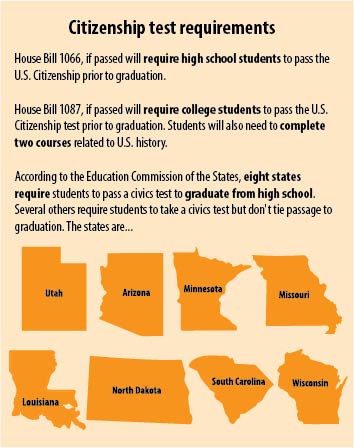
South Dakota legislature proposes mandatory passing of citizenship test
The South Dakota House of Representatives currently has two bills in discussion that would require both high school and college students to take the United States Citizenship test prior to graduation.
House Bill 1066 will require high school students to pass the civics test, while HB 1087 will not only require college students to pass the test but also complete six more credit hours of United States history courses.
Currently, students are not required to take any history course in order to graduate from a South Dakota Board of Regents University. History classes can be taken in order to fill certain general education requirements, however.
David Burrow, chair of the history department, said if HB 1087 does pass, the Board of Regents will have to figure out how they fit the new required courses into all university and student requirements.
“As a historian, obviously I’m happy to have people take more history, but the challenge is we don’t know how that is going to fit into the 120 credit hours,” Burrow said. “If the state tells the Board of Regents, ‘now, you need to increase the required course hours from 120 to 126’ when the board went from 128 to 120 only a few years ago, does this mean now that literally, every program in the state of South Dakota is going to have to eliminate two elective classes out of its course of study?”
If passed, students will have to complete the civics test with a score of 80 percent or higher. They will, however, be allowed to take the test as many times as they need in order to earn this score.
Burrow said one of the concerns with this bill is the lack of clarification on how the test will be administered.
“There is no provision in the bill on who is going to administrate it,” he said. “The legislature also helpfully told us you aren’t going to get any funding for this, you just have to do it, so that’s delightful.”
David Earnest, chair of the political science department, said the bill’s principle is “unobjectionable.”
“Nobody’s going to object that we have to have citizens who are informed about how their government works,” Earnest said. “That’s just an unobjectionable principle. The only question is what’s the right way to do that.”
Elizabeth Duncan, a first-year medical biology major, said she doesn’t see this bill passing because of complications with the required courses.
“I don’t think it will (pass), just because like I know a lot of the state colleges don’t require a lot of humanities classes. I think it’d be a good thing if they did, but it kind of is just difference in opinion for students,” she said. “For my major, obviously I don’t like history that much, not that it’s like bad or anything, it’s just kind of boring, but I mean obviously I think it’s a good thing to learn about government and learn about history. But I don’t see the benefit of it.”
Katrina Callahan, a junior political science major, said she likes the idea of students taking more history classes.
“I like the idea of it. I think that not enough kids know about how the government works and the history of the U.S., and I like the idea of the civics test because I think if we expect people coming into our country to pass the test, I think we should have to pass the test,” Callahan said.
Burrow said passing the civics test is not the challenge, the challenge will be figuring out the logistical aspect of the bill.
“The test in it of itself is not that complicated. From USD and the Board of Regents perspective, it’s just an unfunded mandate,” Burrow said. “They are telling us we have to have a mechanism for students taking this exam and we have to monitor and tell you who is taking this exam, but you’re not giving us any resources to do this. We will have to have a mechanism to monitor that for literally every student in the state of South Dakota. Over and above what you think of the value of having students take the exam is, there is a giant logistical question of how that is going to be implemented.”


